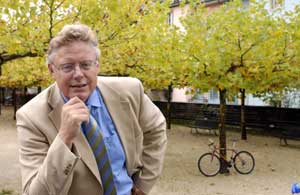Prof. Dr. Klaus Grawe (1943-2005)
Klaus Grawe was Professor of Clinical Psychology and Psychotherapy at the Department of Psychology at the University of Berne, Switzerland. He directed the outpatient clinic for psychotherapy at the University of Berne and the post-graduate training program in psychotherapy for clinical psychologists and medical doctors at the Institute for Psychological Therapy in Zürich and Bern.
Born in Wilster/ Schleswig Holstein, Germany, in 1943 as the second of four children, he grew up in post-war Hamburg with a love of literature, chess, music and swimming. He went to the humanistic track of a Jesuit preparatory school and decided to study history and philology at the University of Hamburg. However, he soon discovered that he had different interests. A soccer accident left him blind for three months. During that time, he changed his plans and decided to study psychology. He began his studies at the University of Hamburg and focused on experimental psychology. He earned his master degree (Diploma) in 1968 and his PhD in 1976.
From 1969 to 1979, he was a clinical and research associate at the Psychiatric Hospital at the University of Hamburg. During this period, he also trained in client-centred and behaviour therapy. In 1971, he co-founded the first inpatient psychotherapy ward at the same hospital and started his first comparative treatment study. He also taught, supervised, and trained graduate and postgraduate students in clinical psychology and behaviour therapy. In 1979 he finished his habilitation at the University of Hamburg and – even before finishing it – received an appointment as Full Professor at the University of Berne in Switzerland. He drafted the new curriculum in Clinical Psychology and Psychotherapy and founded the outpatient centre and an outstanding post-graduate training program. His research interests spanned a wide range of essential topics in psychotherapy research, including outcome and process research, assessment, quality management, large-scale meta-analyses, and theoretical integration.
Klaus Grawe received substantial grants for psychotherapy research projects from the Swiss National Science Foundation. His achievements include more than 150 journal articles and book chapters, mainly in German. He was the author, co-author, editor or co-editor of 12 books. The three most recent have greatly influenced clinical psychology and psychology, especially in Europe and German-speaking countries.
He was a member of the executive committee of the German Psychological Society (DGPs), co-editor of the German Journal of Clinical Psychology and Psychotherapy (Zeitschrift für Klinische Psychologie und Psychotherapie) from 1984-1993, co-editor of the book series “Progress in Scientific Psychotherapy” and board member of several scientific journals including Psychotherapy Research. He received various prestigious awards, including the lifetime award for his contribution to applied psychology from the Association of German Professional Psychologists (Berufsverband Deutscher Psychologinnen und Psychologen, BDP)
His 1994 meta-analysis on the outcome of psychotherapy was the most comprehensive and ambitious in German. It triggered a heated debate in academic circles and the larger community about the efficacy and effectiveness of psychotherapy in general and various approaches. He also contributed to the German psychotherapy legislation as a scientific advisor. Although he viewed a sober analysis of the effects of psychotherapy as a necessity, his scientific heart belonged to more fundamental questions such as: How does the therapeutic process develop? Which ingredients make good psychotherapy beyond the limits of schools of psychotherapy? How can we best train psychotherapists for their demanding tasks? His most recent contributions focused on integrating the newly emerging neurobiology and brain sciences fields with clinical psychology and psychotherapy. With his innovative and profoundly important last book “Neuropsychotherapy: How the Neurosciences Inform Effective Psychotherapy”, he bridged the gap between the neurosciences and the understanding of psychological disorders and their treatment.
The book illustrates that psychotherapy can be even more effective when it is grounded in a neuroscientific approach. Cutting across characteristically disparate disciplines, the book identifies the neural foundations of various disorders, suggests specific psychotherapeutic conclusions, and makes neuroscientific knowledge more accessible to psychotherapists.

